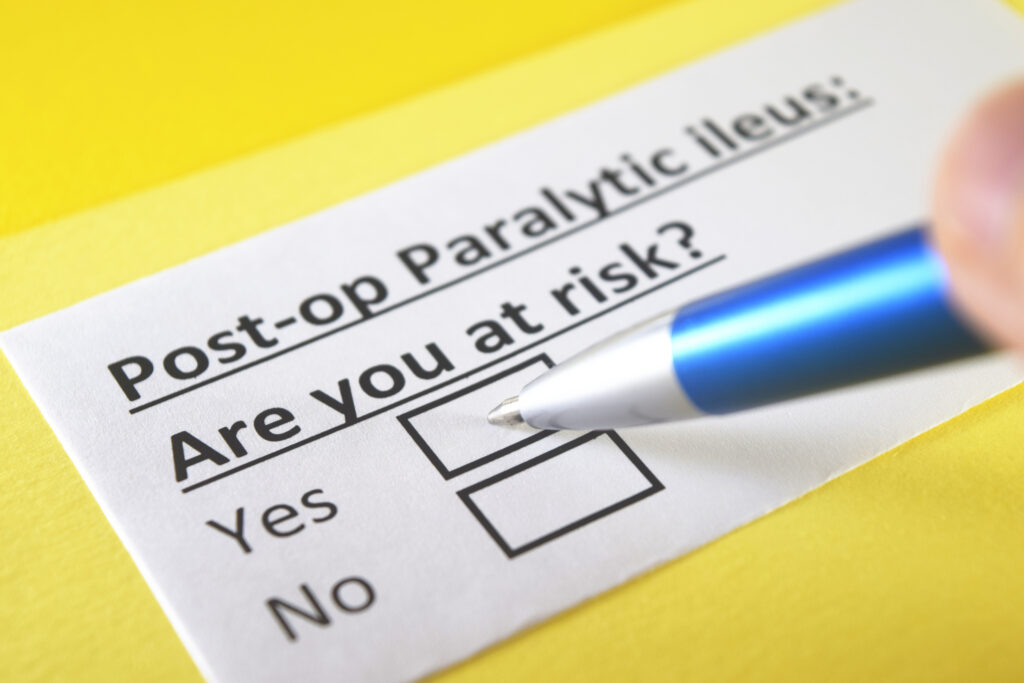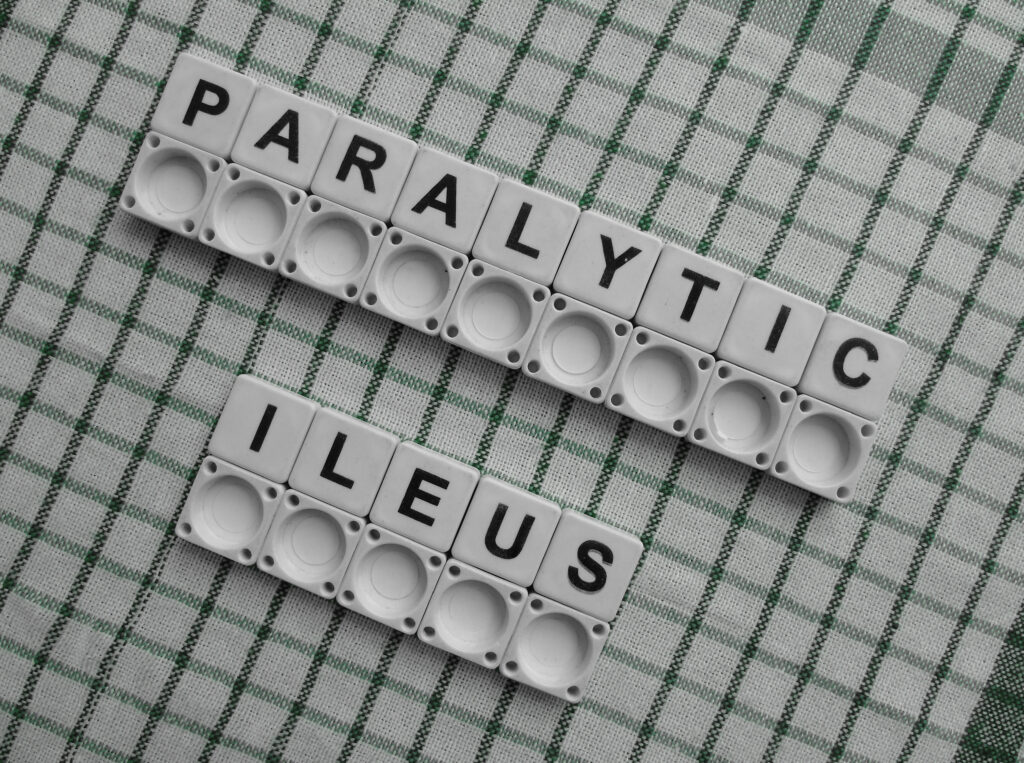Plaintiffs joining the Ozempic mass tort are alleging the medication causes a wide range of complications, including paralytic ileus. The U.S. Food and Drug Administration also recently added warnings to the Ozempic label about this possible adverse effect.
Paralytic ileus occurs when the muscles of the intestines do not allow digested food to pass through, causing a blockage. Surgery, inflammation, or certain medications can cause this serious complication. If left untreated, it can kill.
If you required treatment for this condition after taking Ozempic, you may file an Ozempic lawsuit and join the multidistrict litigation already in progress. Discuss your options with an Ozempic lawsuit attorney for free today.
What Is Paralytic Ileus, and How Is It Linked to Ozempic?
The U.S. Food and Drug Administration (FDA) updated the label for the Type 2 diabetes medication Ozempic to include a warning about the possibility of developing a potentially fatal side effect: blocked intestines. Related medications Mounjaro and Wegovy already included warning labels about blocked intestines.

The FDA added this warning about paralytic ileus to the Ozempic packaging after receiving numerous reports of the complication from users. The FDA’s reporting system, FAERS, shows 71 reports of ileus files by Ozempic users as of December 31, 2023.
Some of the most common side effects of Ozempic are gastrointestinal. They include nausea, vomiting, and diarrhea. Paralytic ileus is much less common. Still, some users are undergoing surgery and treatment for this diagnosis.
Signs of an intestinal blockage or bowel obstruction may include:
- Severe abdominal pain and cramping
- Abdominal bloating
- Loss of appetite
- Inability to pass gas
- Constipation
- Vomiting
Without proper treatment, ileus can be extremely serious. This is a reason to visit the emergency department, as it can result in hospitalization, emergency surgery, and death. Intestinal blockages could damage or tear the intestines, leaking the contents into the belly and leading to serious infections.
Treatment of Paralytic Ileus
The treatment and prognosis for paralytic ileus depend on the severity of symptoms, the patient’s overall health, and other factors. Some possibilities for treating this condition in patients taking Ozempic could include:
Addressing the Underlying Cause
Paralytic ileus treatment involves identifying and addressing the underlying cause. You would need to stop taking Ozempic, and it could take time for your bowel function to return to normal.
Supportive Care
Supportive measures to manage paralytic ileus include intravenous fluids, electrolyte replacement, and nutritional support. This could be required while your bowel function is recovering.
Medication
Depending on your symptoms, your doctor might use medications to stimulate bowel motility. They may also prescribe pain medications to alleviate discomfort.
Nasogastric Decompression
In severe cases, a doctor may insert a nasogastric tube to decompress the stomach and relieve abdominal pain and distension.
Close Monitoring
Patients with paralytic ileus require close monitoring for signs of complications. This could include bowel perforation, infection, and electrolyte imbalances. Bowel perforations often require emergency surgery to repair the hole and greatly increase the risk of infection.
Don't wait any longer, call 866-535-9515 or submit your case for review today!
Prognosis For Patients With Paralytic Ileus
The prognosis for paralytic ileus is generally good if patients receive a prompt diagnosis and appropriate management of the diagnosis.

In many cases, bowel function returns to normal after stopping Ozempic or addressing other causes. However, severe cases or those complicated by other medical conditions may require longer hospital stays and have a higher risk of complications.
Individuals with paralytic ileus must follow their doctor’s recommendations closely and attend follow-up appointments. This is the best way to ensure a full recovery and to monitor for any recurrence or complications. We don’t know yet whether all patients who suffer gastrointestinal side effects while taking Ozempic fully recover.
Other Health Conditions Linked to Ozempic Use
Paralytic ileus is not the only adverse effect reported with Ozempic.
Some of the other health conditions potentially linked to Ozempic and similar drugs include:
- Nausea: Nausea is one of the most common side effects reported by individuals taking Ozempic, especially during the initial treatment period.
- Vomiting: Some people may experience severe or persistent vomiting, particularly when starting Ozempic.
- Diarrhea: Diarrhea is a common gastrointestinal side effect reported by Ozempic users.
- Hypoglycemia: The goal of Ozempic is to lower blood sugar levels. However, extremely low blood sugar can cause sweating, shakiness, dizziness, confusion, and loss of consciousness.
- Gallbladder Disorders: There are reports of gallbladder-related adverse events, including cholelithiasis (gallstones) and cholecystitis (inflammation of the gallbladder), in individuals taking Ozempic.
- Acute Kidney Injury: Ozempic users have reported cases of acute kidney injury, which could call for additional monitoring in those with previous kidney concerns.
- Thyroid Tumors: Animal studies link this medication with an increased risk of thyroid C-cell tumors. Those with a personal or family history of medullary thyroid carcinoma (MTC) or multiple endocrine neoplasia syndrome type 2 (MEN 2) may need closer monitoring.
- Pancreatitis: Some Ozempic users have reported inflammation of the pancreas and related symptoms.
- Gastroparesis: In some rare cases, Ozempic users report a symptom known as “stomach paralysis,” or gastroparesis, when the stomach takes too long to empty.
What Do I Need to Know About the Ozempic Lawsuit?
The United States Judicial Panel on Multidistrict Litigation (MDL) consolidated the lawsuits against Ozempic and other Glucagon-like Peptide-1 Receptor Agonist medications into an MDL on February 2, 2024.
U.S. District Judge Gene E.K. Pratter is overseeing MDL 3094 IN RE: Glucagon-like Peptide-1 Receptor Agonists (GLP-1 RAs) Products Liability Litigation in the U.S. District Court, Eastern District of Pennsylvania.
Plaintiffs continue to file lawsuits and join this MDL, which is already underway. An Ozempic lawsuit lawyer can help you understand your legal options during a free consultation.
What Is Multidistrict Litigation?
Multidistrict litigation is a legal process used to streamline the handling of many complex cases that all involve similar issues. In an MDL, many individual lawsuits that share similar case facts are consolidated and transferred to a single federal district court. There, they undergo pretrial motions, discovery, and bellwether trials as a single case.
What Damages Are Available for Paralytic Ileus in the MDL?
The damages recoverable by plaintiffs in any MDL will vary based on the circumstances, applicable laws, and their unique costs. Some common types of damages recovered for those filing dangerous or defective drug cases include:
Compensatory Damages
Compensatory damages aim to compensate the plaintiff for the losses they suffered because of the drug manufacturer’s product.
These damages could include:
- Economic Damages: These damages cover tangible financial losses such as medical expenses, lost wages, diminished earning capacity, ongoing medical monitoring, and out-of-pocket expenses.
- Non-Economic Damages: These damages compensate for intangible losses such as pain and suffering, emotional distress, loss of consortium, and loss of enjoyment of life.
Punitive Damages
Punitive damages punish the defendant for particularly egregious conduct and deter similar misconduct. These damages go beyond compensating the plaintiff. They send a message that the U.S. legal system will not tolerate this type of behavior.
Injunctions or Equitable Relief

In some cases, plaintiffs may request injunctive relief or other equitable remedies to prevent ongoing harm. For example, they may want the drug manufacturer to issue a recall, require additional monitoring for adverse effects, or implement other safety measures.
It is important to understand that the availability and calculation of damages varies significantly depending on the case. If you are a plaintiff in an Ozempic lawsuit, you will work closely with your attorney to assess the damages you suffered and pursue appropriate compensation through the legal process.
MDL often ends with global or tiered settlements, so you will want to discuss your fair settlement range with your lawyer.
Am I Eligible to Join the Ozempic Lawsuit?
Individuals who have experienced harm or injury due to the use of Ozempic or other semaglutide products may be eligible to file a lawsuit against the manufacturer and join MDL 3094. Discussing your case with a lawyer representing clients in this MDL is the best way to learn more about your options. In general, eligibility to file an Ozempic lawsuit may require:
Injury
You must have suffered harm or injury as a result of using Ozempic. This harm could include adverse side effects, complications, or other medical conditions allegedly caused by the medication. Based on other reports of the condition and the recent FDA warning, this could include paralytic ileus and many other gastrointestinal problems.
Causation
There must be a causal link between using Ozempic and the harm you suffered. In other words, you must demonstrate that this medication directly caused your injury or condition. This will likely play a key part in proving your case against the drug manufacturer.
Legal Standing
You must have legal standing to bring a lawsuit, meaning you were personally harmed by the medication. If your loved one died from paralytic ileus or another complication, you may have legal standing to join the MDL based on their wrongful death.
Statute of Limitations
There is a deadline to file your lawsuit. This is one reason why we recommend talking to an experienced attorney as soon as possible. Failure to comply with the statute of limitations could mean losing your right to sue the drug maker.
If you are considering an Ozempic lawsuit, consult an attorney experienced in mass torts and pharmaceutical litigation. The attorney will evaluate your case, provide legal guidance, and help determine whether you meet the eligibility criteria for filing an Ozempic lawsuit.
Benefits of Working With an Ozempic Lawsuit Lawyer
Your attorney will advocate on your behalf throughout the legal process and work to pursue appropriate compensation for your injuries. Managing a multidistrict litigation case can be complex and challenging. Your attorney will provide:
A Thorough Understanding of MDL Procedures
MDL cases involve consolidating multiple individual lawsuits, making them especially complex. An experienced lawyer will have a strong understanding of MDL procedures and how to navigate this process for you.
Knowledge of the Case
Lawyers handling cases in the Ozempic MDL must understand the facts of the case, including the scientific and medical evidence involved in this dangerous and defective drug lawsuit.
Resource Management
MDL cases are often resource-intensive. They require substantial time, effort, and financial resources to manage effectively. The necessary resources and infrastructure include access to expert witnesses, support staff, and technology.
Case Strategy
Developing a successful legal strategy in an Ozempic lawsuit will require careful analysis of the facts, evidence, and legal precedents. Your lawyer should have the knowledge, experience, and resources to develop a strategic approach tailored to your needs and goals.
Negotiation Skills
Many MDL cases ultimately resolve through settlement negotiations. Experienced lawyers have strong negotiation skills, allowing them to advocate effectively for you. These cases could end with a global, tiered, or individual settlement.
Trial Experience
Most MDL cases settle. If they do not, the individual lawsuits might return to their original jurisdiction to go to trial. If this happens to you, your lawyer will litigate your case in court. They will know how to gather and present evidence, examine witnesses, and argue legal issues before a judge or jury.
Discuss Your Paralytic Ileus and Ozempic Use With an Attorney
If you used Ozempic and required care for paralytic ileus or other serious side effects or complications, discuss your rights with a lawyer as soon as possible. Attorneys representing injured Ozempic users are providing free, confidential consultations. You can learn more about your legal options and how to pursue a case for free today.

You may file a lawsuit against Ozempic’s manufacturer and hold the company legally responsible for your paralytic ileus and other health concerns. The MDL is already underway, so act quickly.
Ultimately, an Ozempic lawyer’s role in an MDL case is to advocate for their client’s rights and interests. Your lawyer will fight to ensure you receive the compensation you deserve for your injuries and losses after using this drug.
Get started by calling (866) 535-9515 to speak to an Ozempic lawsuit attorney.